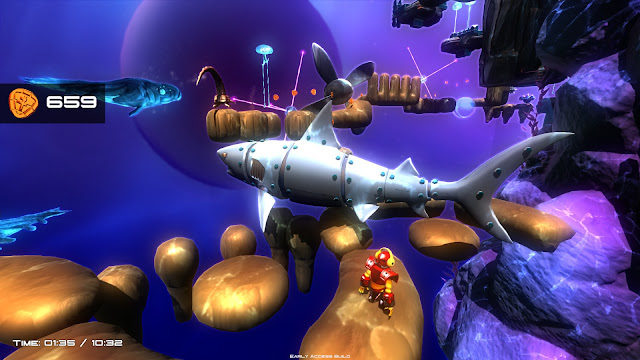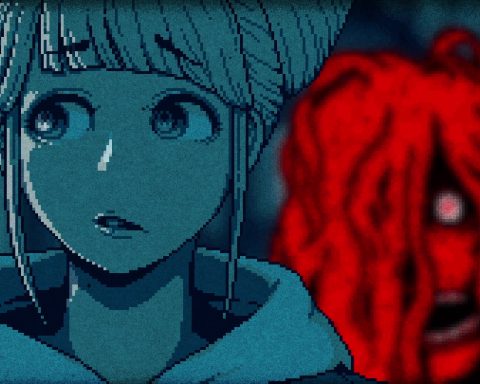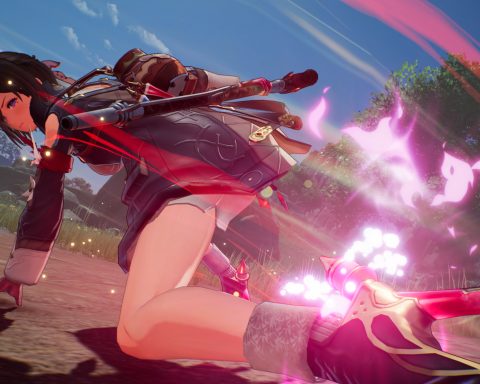Review by Matt S.
Imagine, if you will, Super Monkey Ball as a platformer. Only the levels are randomised. And then you’re encouraged to speedrun it. Welcome to Rogue Singularity; a platformer that is going to absolutely brutalise you, and yet, you’re going to keep coming back for more because as simple as the action is, it has the X-factor in spades.
I will start with a complaint, though; I understand why the developers went with the “roguelike” approach to levels. That way there’s always a sadistic new challenge awaiting players every time they boot the game up and navigate themselves over to the “Daily Challenge” section. But one of the things that made Monkey Ball’s “gauntlet of cruelty” approach to level design so appealing was how carefully constructed it was. Introduce an element of randomness and by its very nature the game loses the capacity that it would otherwise have to demand practice and precision. In its place Rogue Singularity tests lower, purely twitch-based set of skills, while offering that same visual impression of a gauntlet of cruelty. That’s fine, but the moment-to-moment gameplay doesn’t offer the same memorable design that some of Monkey Ball’s levels have.
There’s also a surprisingly limited number of obstacles for an experience that relies on repeat play. Those obstacles are all tortuously effective at killing your character, because the combinations can be such a clusterbeep that you’ll look at them and wonder how on earth anyone could navigate them. It doesn’t take look for the repetition in seeing those obstacles to start becoming draining, however.
This game is platformer Monkey Ball with random levels. It’s gonna ruin me. #NintendoSwitch pic.twitter.com/hV1pc7tvZm— Hatsune Miku is the real God 🇯🇵 (@DigitallyDownld) August 17, 2019
I get the feeling that the logic behind having a relatively thin roster of obstacles was because the developer wanted to ensure that the random nature of their placement didn’t result in combinations that were truly impossible to navigate. Credit has to go to the developer here, because not once did I run into a level that I failed at for any reason other than my own poor platforming skills. There is a way to navigate through every level, with a combination of good twitch response, timing and planning. It’s a little like Mario Maker 2 in this regard. I see some of the levels that people have created and know that I’ll never be able to get through them, even though I know without a shadow of a doubt it’s possible to, because Nintendo doesn’t allow players to upload stuff that can’t be solved.
Where Rogue Singularity does become a little overwhelming is in the use of powerups or abilities, because there’s a fair amount of stuff to unlock, and, depending on the level you will want to go with different loadouts. A generally poor onboarding process leaves players to mostly figure this out for themselves, though, and in the context of a game that’s as unforgiving in difficulty as this one, that’s an unforgivable oversight. Say what you want about Dark Souls or Sekiro, but there’s not a player out there that could say that those games didn’t make sure you knew how to play them before proceeding to ruin you with their challenge.
I’d also be remiss if I didn’t say that there’s one glaring technical issue with Rogue Singularity, and that’s its camera. It’s fine to give players a speedrunning action experience, but if you do that, you have to make sure that it’s possible to move through the game’s spaces without having to wrestle with the camera. Far (far) too often I needed to reposition the camera to gauge the distance to the next platform that I needed to jump to, or simply to find my character because a wall had got between the camera and him. I didn’t lose too many lives to this camera, and it’s responsive enough when I did need to swing it around, but those moments where my character is stationary are completely at odds with the rest of Rogue Singularity’s design principles.
Two things redeem Rogue Singularity, and even make it great. Firstly, there’s the pulsating music, blending retro instruments and beats with modern sound design. The soundtrack is spot-on perfect for setting a rhythm to the action, and while I find it quite gaudy outside of the context of play, when I was playing I realised that it had faded right into the background, and was surprisingly subtle in the way that it was guiding my movements and actions.
The second truly great feature of Rogue Singularity is its leaderboard. Not only does this game challenge you to finish its levels, but it wants you to do them fast. The entire experience has been built around speedrunning, and in that context, its limitations otherwise really do make a lot more practical sense. It makes sense to keep the number of obstacles down, because too many different traps and tricks would slow down the potential for endless forward movement. The randomisation makes sense because, though the capacity for precision is lost, rote memorisation of levels is no longer enough to speed through. Suddenly this is a speedrunning skill-tester that really does test the skills, rather than the muscle memory.
None of this is my kind of game, and I do feel a little silly taking on a review of something that throws me so far out of my depth. And yet, I genuinely enjoy Rogue Singularity. I’ll never see my name high on the leaderboards. I took more attempts than I care to admit to just clear the first level that was thrown at me. But for a game with no narrative – usually my anathema – Rogue Singularity’s charm and verve hooked me in and I’ve had a lot of fun dusting myself off for another run.
Rogue Singularity is perfect for the Switch. Levels are short and sharp, making it ideal for instant pick-up-and-play, and if you’re going to invest in this one, you’re going to need every moment to refine your skills that you can find. As I said, this really isn’t my genre, so I don’t know where it will sit in the estimation of those who do play a lot of platformers that set the difficulty level to “sadistic,” but I can say that I had a great time with this particular example of that sub-genre.
– Matt S.
Editor-in-Chief
Find me on Twitter: @digitallydownld










